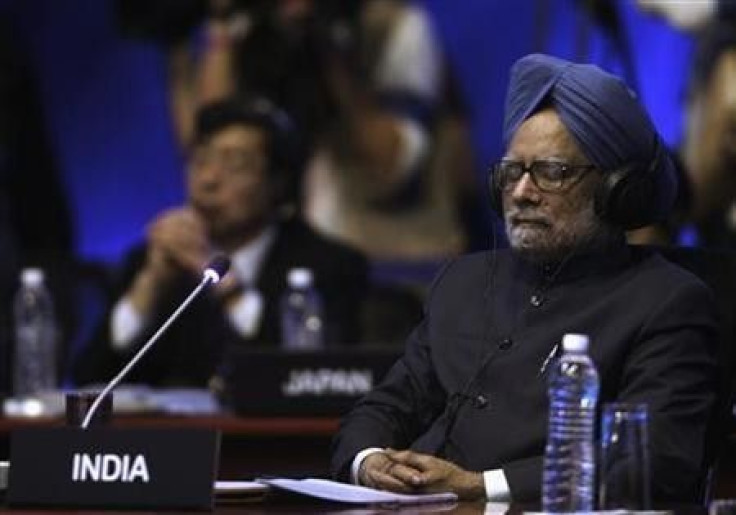Indian Prime Minister Singh Visits Iran: Finding A Delicate Balance
ANALYSIS

Prime Minister Manmohan Singh has arrived in Tehran to attend the Non-Aligned Movement summit, making him the first Indian PM to visit Iran since 2001 when Atal Bihari Vajpayee made the trip.
The Times of India reported that during his four-day stay, Singh will hold bilateral talks with Pakistani President Asif Ali Zardari as well as senior Iranian officials, including Iran's Supreme Leader Ayatollah Ali Khamenei and President Mahmoud Ahmadinejad.
Singh is also expected to meet with the new Egyptian president, Mohammed Morsi.
India is under pressure from the United States to reduce its ties with Iran, which needs to export its oil to countries like India due to heavy sanctions imposed by the west over its nuclear program. While India has already reduced its dependence on Iranian oil (India now imports 9 percent of its crude from Iran, down from 12 percent last year), it remains one of Tehran’s top customers.
Victoria Nuland, a spokesman for the U.S. State Department, said in a statement: “We, frankly, don’t think that Iran is deserving of these high-level presences that are going there.”
Nuland didn’t mention Singh by name, but the implication was clear by ‘high-level presences.’
C. Raja Mohan, a fellow at New Delhi’s Observer Research Foundation, told the Wall Street Journal: “India is not going to abandon Iran just because the U.S. wants it to. But it doesn’t mean it will pick a fight with the U.S. either.”
Mohan added: “[India] will continue to walk the tightrope and show how good we are at walking the tightrope.”
India’s complex relationship with Iran stretches back over centuries.
Iranian (or Persian) influence has produced a deep imprint upon Indian art, poetry, architecture and literature. With periodic invasions, military adventures and constant cross-migrations between the two empires, the people of Iran and northern India share many cultural and ethnic characteristics.
In the 21st century, the relations between these two great nations must be framed along the lines of geo-politics and oil, rather than art and culture.
Although India was greatly worried by the 1979 revolution in Iran that toppled the Shah and established an Islamic state, New Delhi and Teheran have generally enjoyed good relations. That tie became stronger with India's insatiable appetite for energy in tandem with western sanctions that have pressured Iran to find customers for its crucial oil exports.
Pakistan, which is squeezed between India and Iran, also must be considered in any New Delhi-Tehran dialogue.
“The newly formed theocratic Iranian regime was not warmly received by India at first,” said Dilshod Achilov, a professor of political science at East Tennessee State University at Johnson City, Tenn.
In particular, India's main concern was a potential strong alliance that could emerge between Iran and Pakistan. However, given the strong anti-American sentiments in the post-1979 Iran, Pakistan's close relations with the U.S. [presented] a major roadblock for future Iran-Pakistani cooperation.”
Aside from geopolitical considerations, oil is at the heart of Indian-Iranian relations today.
“With its booming economy, India realized that it needed Iran's rich energy resources,” Achilov said.
“For Iran, India was a huge market and a potential regional partner (as Iran had become isolated or disconnected from the world after the Khomeini revolution). It is fair to say that trade and economic relations embedded in energy politics are key defining features of Iran-India relations.”
India has to play a delicate balance between satisfying its energy needs and not alienating the US too much.
“Energy-hungry India needs Iranian crude,” Achilov noted.
“In addition, Iran is a sizable market for Indian goods and services. With this in mind, criticizing the Iranian nuclear program would sever the bilateral relations between Tehran and New Delhi.”
Achilov doubts that Indian will end its trade cooperation with Iran anytime soon.
"Siding with the West can yield short-time payoffs/gains for India," he said.
“However, India will arguably consider a long-term relationship with Iran more heavily rather than opting for short-term, temporary gains. Depending on the complexity of pressures and financial incentives offered by the West, India may choose to curb its imports, but it is less likely that India will halt its oil imports from Iran. At the end of the day, India and Iran are there to stay as neighbors and find ways to co-exist in the future.”
Some forces in India would like to see Singh deepen his relation with Tehran.
The First Post newspaper of Indian reported that Punjab’s Deputy Chief Minister Sukhbir Singh Badal asked PM Singh to pursue “greater trade ties between Punjab and the Middle East and West Asia,” particularly with Iran.
(The Prime Minister is a Sikh from Punjab himself).
Retd. Colonel Anil Athale, coordinator of the Indian Initiative for Peace, Arms-control & Disarmament, believes PM Singh should use the summit in Iran as a foundation for becoming a mediator between the west and the mullahs of Tehran.
“Iran has to understand that many threats to its security arise from its own aggressive policy of 'export' of its revolution,” he wrote in a column for Rediff.com
“India ought to impress on Iran that unless it gives up its aggressive posture, even acquisition of nuclear weapons will not make it secure… India has a great opportunity to act as go between Iran and the rest.”
© Copyright IBTimes 2024. All rights reserved.











